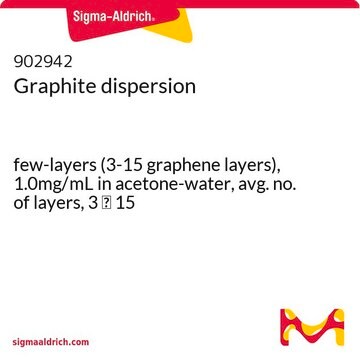496596
Graphite
powder, <45 μm, ≥99.99% trace metals basis
Sign Into View Organizational & Contract Pricing
All Photos(2)
About This Item
Empirical Formula (Hill Notation):
C
CAS Number:
Molecular Weight:
12.01
EC Number:
MDL number:
UNSPSC Code:
12352103
PubChem Substance ID:
NACRES:
NA.23
Recommended Products
grade
battery grade
Assay
≥99.99% trace metals basis
form
powder
mol wt
Mw 12.011 g/mol
composition
C
particle size
<45 μm
mp
3652-3697 °C (lit.)
density
2.26 g/cm3 (lit.)
application(s)
battery manufacturing
SMILES string
[C]
InChI
1S/C
InChI key
OKTJSMMVPCPJKN-UHFFFAOYSA-N
Looking for similar products? Visit Product Comparison Guide
Related Categories
General description
Graphite is a versatile material with high thermal conductivity, excellent electrical conductivity, and remarkable lubricating capabilities. In the electronics sector, graphite is utilized in batteries and fuel cells due to its ability to enhance performance and energy efficiency. Additionally, the automotive industry graphite is used in brake linings and lubricants, while the aerospace sector benefits from its lightweight and high-temperature resistance.
Application
- Synthetic opioid analgesic: MethaDoneserves as a synthetic opioid analgesic in clinical settings, offering pain relief options for patients who are resistant to other opioids. Studies examine its analgesic properties and side effects to enhance patient safety and comfort (Hughes et al., 2024).
- In vitro pharmacological studies: In vitro studies utilize methaDonesolutions to investigate its pharmacodynamics and pharmacokinetics. These studies help determine how methaDoneinteracts with various biological systems, influencing future drug design and therapy approaches (Degani et al., 2023).
- Drug metabolism research: MethaDoneis used in research to study drug metabolism, particularly how it is processed within the body. This research is vital for understanding drug interactions, effects on liver enzymes, and implications for long-term treatment efficacy (Hu et al., 2023).
Storage Class Code
11 - Combustible Solids
WGK
nwg
Flash Point(F)
Not applicable
Flash Point(C)
Not applicable
Personal Protective Equipment
dust mask type N95 (US), Eyeshields, Gloves
Certificates of Analysis (COA)
Search for Certificates of Analysis (COA) by entering the products Lot/Batch Number. Lot and Batch Numbers can be found on a product’s label following the words ‘Lot’ or ‘Batch’.
Already Own This Product?
Find documentation for the products that you have recently purchased in the Document Library.
Customers Also Viewed
Craig E Banks et al.
The Analyst, 131(1), 15-21 (2006-01-24)
Different types of carbon based electrodes have emerged over the last few years, significantly changing the scope and sensitivity of electro-analytical methods for the measurement of diverse targets from metal ions through gases to biological markers. This Highlight article shows
M A Pimenta et al.
Physical chemistry chemical physics : PCCP, 9(11), 1276-1291 (2007-03-10)
Raman spectroscopy has historically played an important role in the structural characterization of graphitic materials, in particular providing valuable information about defects, stacking of the graphene layers and the finite sizes of the crystallites parallel and perpendicular to the hexagonal
R Hanoa
Scandinavian journal of work, environment & health, 9(4), 303-314 (1983-08-01)
Six hundred and five cases of graphite pneumoconiosis have been reported in the literature. In 39 cases the diagnosis was based on or supported by autopsy or lung biopsy results. Only 14 of the 39 cases were presented with relatively
Craig E Banks et al.
Analytical sciences : the international journal of the Japan Society for Analytical Chemistry, 21(11), 1263-1268 (2005-12-02)
The recent development, behavior and scope of edge plane pyrolytic graphite electrodes in electroanalysis are overviewed. Similarities to, and advantages, over multi-walled CNT modified electrodes are noted and the wide scope of applications, ranging through gas sensing, stripping voltammetry and
Stephanie Reich et al.
Philosophical transactions. Series A, Mathematical, physical, and engineering sciences, 362(1824), 2271-2288 (2004-10-16)
We present a review of the Raman spectra of graphite from an experimental and theoretical point of view. The disorder-induced Raman bands in this material have been a puzzling Raman problem for almost 30 years. Double-resonant Raman scattering explains their
Our team of scientists has experience in all areas of research including Life Science, Material Science, Chemical Synthesis, Chromatography, Analytical and many others.
Contact Technical Service






